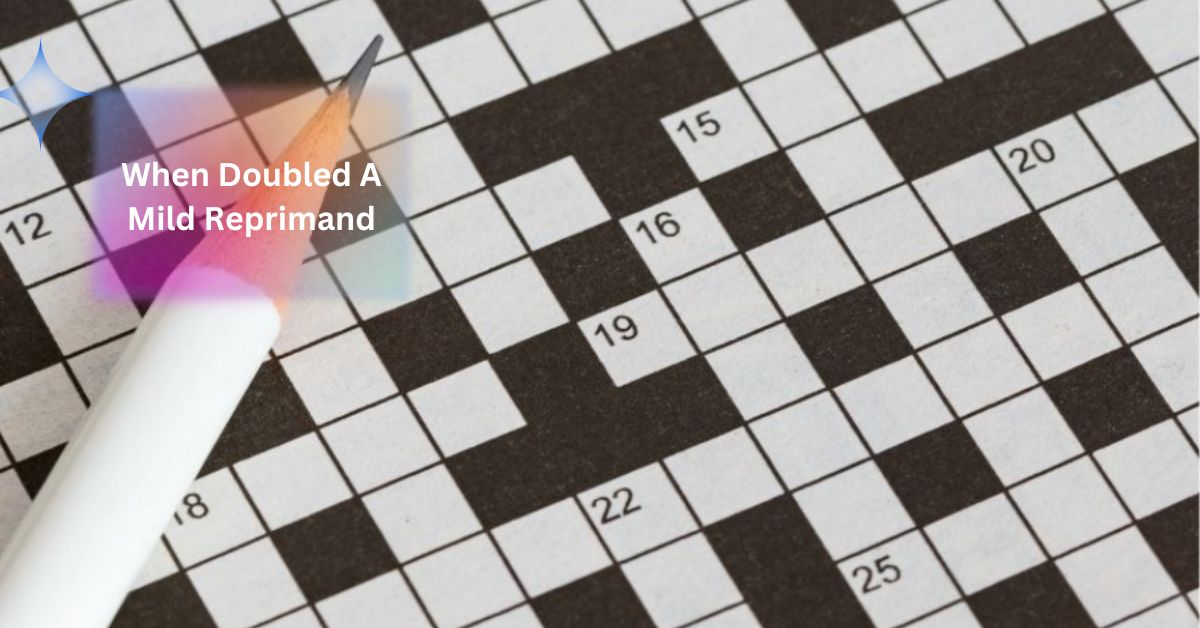When Doubled A Mild Reprimand: Mastering Crossword Clues
Crossword puzzles are a fantastic way to exercise your brain and expand your vocabulary. However, some clues can stump even the most seasoned solvers.
The crossword clue “When doubled, a mild reprimand” calls for doubling a term that denotes a mild punishment. The solution to this clue is “tut-tut,” as doubling the word “tut” results in this expression, which is used to convey mild disapproval.
Join us as we unravel the mystery behind “When doubled, a mild reprimand,” and discover how this clue exemplifies the clever wordplay that makes crosswords fascinating.
Introduction To Crossword Clues:
Crossword clues come in various forms, each presenting its unique challenge. Common types include straightforward definitions, cryptic clues, and wordplay, each requiring different solving strategies.
Some clues are simple and direct, while others use puns, anagrams, or hidden meanings to obfuscate the answer. The difficulty level can range from easy to highly complex, depending on the puzzle’s design and the solver’s familiarity with the clues.
Understanding and solving clues like “When doubled, a mild reprimand” is crucial for improving your crossword skills. These clues often involve patterns and wordplay that are not immediately obvious.
By deciphering such clues, you develop sharper analytical skills and a deeper appreciation for the nuances of crossword puzzles. Mastering these challenging clues enhances your puzzle-solving abilities and makes the solving experience more enjoyable and rewarding.
Decoding The Clue: “When Doubled, A Mild Reprimand”:
What Does “When Doubled” Mean in Crossword Puzzles?
- Definition of “Doubled”: In crossword puzzles, “doubled” refers to repeating a word or letter. This means that the answer to the clue involves a word or phrase that, when repeated, fits the given definition.
- Examples in Clues: If the clue indicates that a word should be doubled, the solver must find a word that makes sense when it appears twice. For instance, in the clue “When doubled, a mild reprimand,” the solution involves a word related to a mild reprimand that, when repeated, forms a common phrase.
Understanding “A Mild Reprimand”:
- Definition: A mild reprimand is a gentle or slight expression of disapproval. It is not severe or harsh but rather a soft criticism intended to correct or point out a minor mistake.
- Common Examples: “Tut-tut”: This phrase conveys mild disapproval, often playfully or gently. It’s an example of how a slight reprimand can be expressed in everyday language.
- “A slap on the wrist”: Another example is this phrase, which denotes a minor punishment or criticism, implying that the reprimand is not severe.
- Usage in Language: Mild reprimands are often used when formal or harsh criticism is unnecessary. They point out mistakes or offer correction in a less confrontational way.
Common Solutions For “When Doubled, A Mild Reprimand”:
“Now”:
- Explanation: The term “now” fits the clue because when it is doubled, it becomes “now-now.” In some contexts, “now-now” can express a mild reprimand or urgency. For example, a parent might use “now-now” to gently insist on immediate action.
- Usage in Puzzles: While not as common as other answers, “now” has appeared in various crossword puzzles to solve clues involving repetition. Its usage is more nuanced and less frequent than phrases like “tut-tut.”
“Tut-Tut”:
- Explanation: “Tut-tut” is a standard answer because it directly represents a mild reprimand. The phrase expresses disapproval or mild annoyance, typically used in a gentle or disapproving tone.
- Historical Context: The expression “tut-tut” has been used in English since the 16th century. It originates from the sound of disapproval or discontent, and its use has persisted in both written and spoken language. The repetition of “tut” emphasizes the mild nature of the reprimand, making it an ideal fit for this crossword clue.
“Slap on the Wrist”:
- Explanation: The phrase “a slap on the wrist” fits the clue as it denotes a minor or slight reprimand. It implies a minor correction or punishment that is not severe, aligning with the idea of a mild reprimand.
- Usage: Commonly used in both everyday language and formal contexts, this phrase represents a lenient response to a minor infraction. It’s often employed to describe a situation where a more severe consequence was avoided.
- Comparison with Other Reprimands: Unlike harsher reprimands such as “scolding” or “reprimanding,” a “slap on the wrist” indicates a gentler approach. This distinction helps to categorize it as a mild form of correction compared to more severe forms of reprimand.
Exploring Crossword Clues: Case Studies:
Notable Crossword Puzzles Featuring The Clue:
- Case Study 1: In a New York Times crossword from March 2021, the clue “When doubled, a mild reprimand” appeared. The answer “tut-tut” was used, showcasing its role as a common expression of mild disapproval. This case highlights how the phrase fits well within crossword puzzles by reflecting everyday language.
- Case Study 2: Another instance can be found in the LA Times crossword from June 2022. Here, “tut-tut” was again the solution to a clue involving a doubled term. This repetition reinforces its usage and acceptance as a standard answer for mild reprimands in crosswords.
Strategies For Solving Similar Clues:
- Identify Patterns: Look for clues that hint at repetition or doubling in the solution. Words or phrases that, when repeated, fit the clue’s definition are often the answer.
- Understand Definitions: Familiarize yourself with common phrases that fit the description of mild reprimands. Knowing these can help quickly pinpoint the correct answer when similar clues appear.
- Practice with Examples: Solve puzzles that feature similar wordplay to build recognition skills. Practice helps identify the patterns and nuances in crossword clues.
Real-Life Implications Of “When Doubled, A Mild Reprimand”:
Application In Everyday Language:
- Examples:
- “Tut-Tut”: Used in everyday conversations to express mild disapproval. For example, a teacher might say “tut-tut” when students forget to do their homework, indicating gentle reproach without serious consequences.
- “Slap on the Wrist” is often used in work environments or personal situations to describe minor disciplinary actions. For instance, a manager might give an employee a “slap on the wrist” for a minor infraction like being late to a meeting, signifying a gentle reminder rather than a severe reprimand.
Cultural Variations In Reprimands:
- Different Interpretations:
- Western Cultures: Phrases like “tut-tut” and “slap on the wrist” are commonly used to signify mild disapproval. They are often informal and convey a sense of mild rebuke.
- Other Cultures: In some cultures, the concept of a mild reprimand might be expressed differently. For instance, in Japanese culture, mild reprimands are often conveyed through subtle non-verbal cues or indirect language rather than direct phrases. Similarly, in some African cultures, gentle reprimands might involve storytelling or proverbs rather than explicit criticism.
- Usage Differences: The manner and frequency of mild reprimands can vary greatly. What is considered mild in one culture might be perceived as more serious or less serious in another, reflecting different social norms and communication styles.
Tips And Tricks For Crossword Enthusiasts:
Expand Your Vocabulary:
Regularly read diverse materials, including books, newspapers, and magazines, to build a broader vocabulary. Understanding a wide range of words and phrases will help you recognize and solve clues more easily.
Practice With Crossword Puzzles:
Solve various crosswords, from easy to challenging, to improve your skills. Frequent practice helps you become familiar with different clue types and problem-solving strategies.
Learn Common Clue Patterns:
Familiarize yourself with standard crossword clue formats and wordplay techniques, such as anagrams, abbreviations, and double meanings. Recognizing these patterns will make solving clues quicker and more intuitive.
Use Crossword Solving Tools:
Utilize online crossword solvers and dictionaries to assist with challenging clues. These tools can provide hints or confirm your answers, aiding in solving more complex puzzles.
Study Crossword Puzzle Solutions:
Review solved crosswords to understand how certain clues are approached and solved. Analyzing past solutions can offer insights into solving similar clues in the future.
Join Crossword Communities:
Participate in online forums or local crossword clubs to share tips and strategies with other enthusiasts. Engaging with the crossword community can provide valuable advice and support.
Keep A Crossword Journal:
Maintain a journal of challenging clues and their solutions. Refer to it when encountering similar clues in future puzzles to reinforce your problem-solving techniques.
Focus On Word Patterns:
Attention to common prefixes, suffixes, and letter patterns frequently appearing in crosswords. Recognizing these patterns can help you quickly identify potential answers.
Solve Crosswords Regularly:
Consistent practice is key to improving your crossword skills. Make solving puzzles a routine to enhance your solving abilities continuously.
Be Patient And Persistent:
Some clues may be challenging and require time to solve. Approach each puzzle patiently and persistently, and don’t be discouraged by difficult clues.
Conclusion:
In conclusion, unravelling the clue “When doubled, a mild reprimand” reveals the intriguing interplay between wordplay and crossword puzzles. By examining answers like “tut-tut,” “now,” and “slap on the wrist,” we gain insight into how doubling can transform simple terms into expressions of mild disapproval. Understanding these clues enhances your crossword skills and deepens your appreciation for the art of puzzle-solving. Applying the strategies and tips discussed can elevate your puzzle-solving experience, making it more engaging and enjoyable. Keep practising and exploring; you’ll master even the most challenging crossword clues.
FAQ’s:
1. How Do I Recognize When A Clue Involves Doubling?
Look for clues that hint at repetition or require you to repeat a word or phrase to fit the definition.
2. Can “Tut-Tut” Be Used In Different Crossword Puzzles?
Yes, “tut-tut” frequently appears in crosswords as it fits various clues related to mild disapproval or repetition.
3. Why Might “Now” Be An Answer To A Crossword Clue?
“Now” might be used in clues that involve doubling or urgency, though it is less common compared to phrases like “tut-tut.”
4. Are There Other Phrases Similar To “Slap On The Wrist”?
Yes, phrases like “gentle rebuke” or “mild scolding” can also represent a mild reprimand in different contexts.
5. How Can I Improve My Ability To Solve Tricky Crossword Clues?
Practice regularly, study common clue patterns, and use crossword-solving tools to enhance your skills and speed.
6. Why Are Mild Reprimands Used In Crosswords?
They add variety and challenge, requiring solvers to think creatively and understand subtle meanings.






